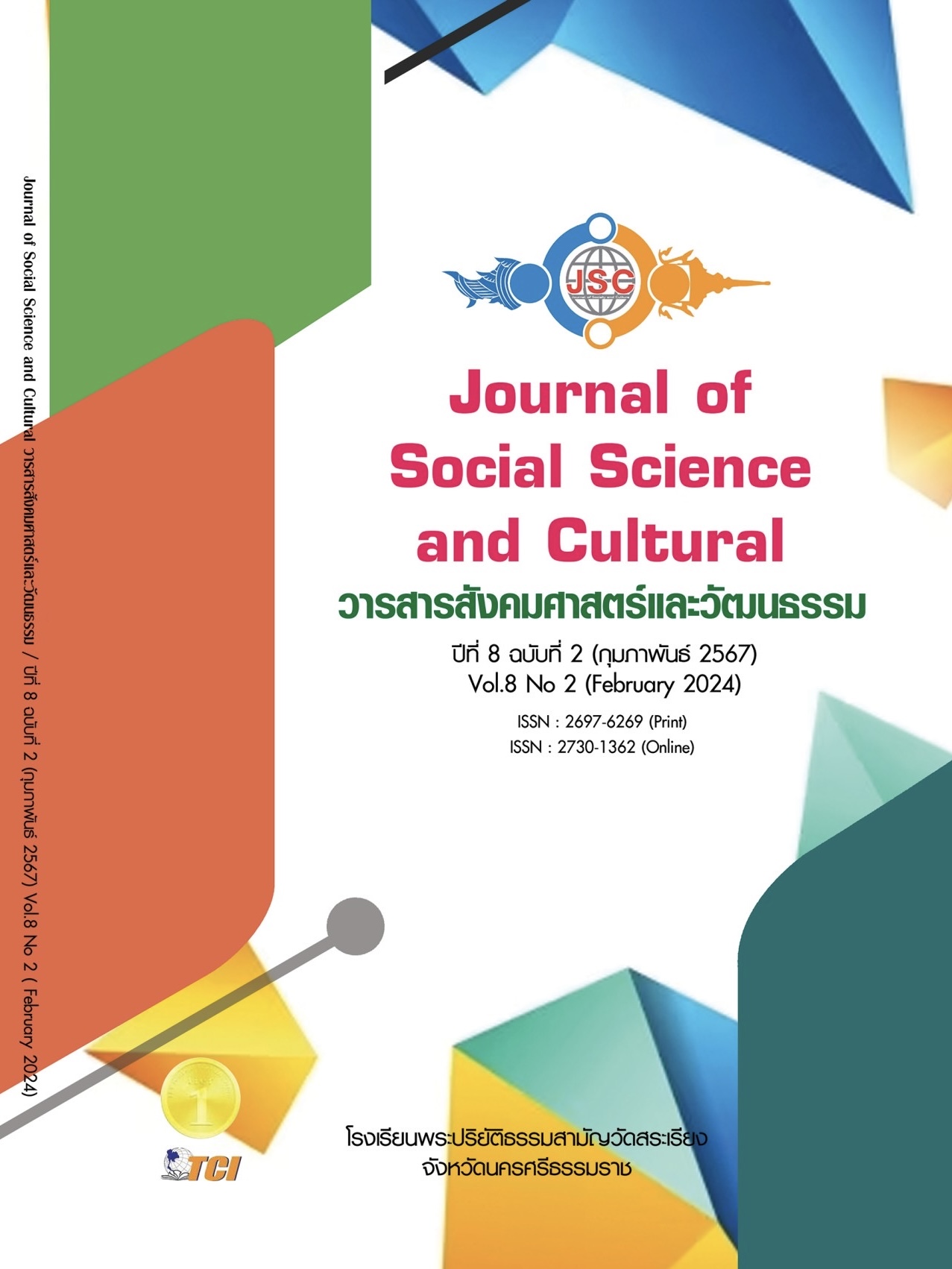THE EFFECT OF IMPLEMENTING NURSING PRACTICE GUIDELINE OF PATIENTS WITH ALCOHOL DRINKING HISTORY AND ADMITTED IN PATIENTS DEPARTMENT SISATCHANALAI HOSPITAL SUKHOTHAI PROVINCE
Main Article Content
Abstract
This quasi-experimental research was the one group, pretest-posttest design to study the effect of implementing nursing practice guideline of patients with alcohol drinking history and admitted in patient’s department Sisatchanalai hospital Sukhothai province. The experimental group received nursing in accordance with the nursing practice guidelines for patients with a history of alcohol use. Using the concept of empowerment and follow-up assessment at the end of the 8th week. The research was conducted during April - May 2021. The samples were obtained by using the formula for calculation. A sample of 33 people was obtained by applying the process of developing a nursing practice guideline according to the concept of empowerment of Gibson. It consists of a four-step activity plan: 1) discovering real situations, 2) critical reflection, 3) deciding to choose a course of action that is appropriate for one's self, and 4) maintaining effective practice. Verify the quality of the instrument by determining the content accuracy of 0.85. (Reliability) of the alcohol knowledge questionnaire. The researcher used the experiment (Try-Out) with the target group of 30 people and analyzed the reliability of the instrument using Conbach's Alpha Coefficient formula equal to 0.83. the person of the sample data was analyzed by frequencies, percentages and mean values. The mean scores of alcohol withdrawal symptoms of the group and the mean scores of alcohol-related knowledges of the sample were analyzed by paired t-test statistics after the 8th week of research. The results reveal that: 1) The average score of alcohol withdrawal symptoms of the experimental group patients before and after the trial, there were statistically significant differences at p< .05 2) The mean scores of alcohol knowledge of the patients in the pre- and post-trial group were significantly different at the p< .05 level. Statistics at p< .05 level
Article Details
References
เบญจวรรณ ละหุการ และคณะ. (2563). ผลของโปรแกรมการเสริมสร้างพลังอำนาจร่วมกับการสนับสนุนของสามีต่อพฤติกรรมการเลี้ยงลูกด้วยนมแม่และความสำเร็จ ของการเลี้ยงลูกด้วยนมแม่ในมารดาวัยรุ่นครรภ์แรก. วารสารมหาจุฬานาครทรรศน์, 7(11), 79-93.
แอน ไทยอุดม และนที ล่มนอก. (2561). การพัฒนาและประเมินผลการใช้แนวปฏิบัติการพยาบาลที่สร้างจากหลักฐานเชิงประจักษ์สำหรับผู้ป่วยสมองบาดเจ็บระดับปานกลางถึงรุนแรง. วารสารพยาบาลทหารบก, 19(3), 107-116.
จารวี คณิตาภิลักษณ์ และคณะ. (2563). ผลของโปรแกรมการเสริมสร้างพลังอำนาจต่อคุณภาพชีวิตของผู้สูงอายุที่เป็นโรคหลอดเลือดสมอง. พยาบาลสาร, 47(1), 222-230.
ณัฏฐ์วรัตถ์ อเนกวิทย์. (2561). ผลลัพธ์ทางคลินิกของการใช้แนวทางการดูแลผู้ที่มีปัญหาพฤติกรรมการดื่มสุราในแผนพัฒนาระบบบริการสุขภาพจังหวัดมหาสารคาม. วารสารสมาคมจิตแพทย์แห่งประเทศไทย 2561, 63(4), 371-382.
ทัศมาภรณ์ สุทธิรักษ์ และคณะ. (2563). ผลของโปรแกรมการเสริมสร้างพลังอำนาจต่อการปฏิบัติของครอบครัวในการบริหารข้อสำหรับผู้ที่เป็นโรคหลอดเลือดสมอง. วารสารสภาการพยาบาล, 35(4), 70-83.
ธาราทิพย์ ไชยวุธ และคณะ. (2563). ผลของโปรแกรมการเสริมสร้างพลังอำนาจต่อการปฏิบัติการจัดท่าผู้สูงอายุติดเตียงในอาสาสมัครสาธารณสุขประจำหมู่บ้าน. พยาบาลสาร, 47(4), 114-127.
นุสรา ศรีกิจวิไลศักดิ์ และสิริมา มงคลสัมฤทธิ์. (2559). ประสิทธิผลของโปรแกรมการปรับเปลี่ยนพฤติกรรมการดื่มเครื่องดื่มแอลกอฮอล์ในกลุ่มที่มีรูปแบบการดื่มแบบเสี่ยงต่ำหรือเสี่ยงสูง. วารสารสาธารณสุขมหาวิทยาลัยบูรพา, 11(1), 39-51.
พนิดา ศรีใจ และคณะ. (2563). ผลของโปรแกรมการเสริมสร้างพลังอำนาจต่อการปฏิบัติการบริหารกล้ามเนื้อสำหรับผู้พิการทางการเคลื่อนไหวในอาสาสมัครสาธารณสุขประจำหมู่บ้าน. พยาบาลสาร, 47(4), 128-141.
พรรณทิพา บัวคล้าย และคณะ. (2562). ผลของโปรแกรมเสริมพลังอำนาจต่อความรู้ การรับรู้พลังอำนาจในตนเองและพฤติกรรมสุขภาพขณะตั้งครรภ์และหลังคลอดของผู้ต้องขังหญิงตั้งครรภ์และมารดาหลังคลอดที่มีเด็กติดผู้ต้องขังในทัณฑสถานหญิง. วารสารการพยาบาล การสาธารณสุข และการศึกษา, 20(1), 28-39.
วรดา ทองสุก และคณะ. (2563). ผลของโปรแกรมการเสริมสร้างพลังอำนาจต่อพฤติกรรมสุขภาพ ดัชนีมวลกายและระดับความดันโลหิตในผู้ป่วยโรคความดันโลหิตสูงที่ควบคุมไม่ได้. พยาบาลสาร, 47(4), 229-241.
อภิชาติ กาศโอสถ และคณะ. (2562). การพัฒนาโปรแกรมการเสริมสร้างพลังอำนาจสำหรับผู้ป่วยโรคข้อเข่าเสื่อม. พยาบาลสาร, 47(3), 168-180.
อัชรา ฦๅชา และคณะ. (2563). ประสิทธิผลของโปรแกรมกลุ่มการเสริมสร้างพลังอำนาจผู้ดูแลผู้สูงอายุที่มีความผิดปกติทางจิตจากกลุ่มโรคสมองเสื่อม. วารสารป้องกันการฆ่าตัวตายแห่งประเทศไทย, 1(1),41-56.
อุไรวรรณ พานทอง และพัชราภรณ์ ขจรวัฒนากุล. (2563). ผลของโปรแกรมการเสริมสร้างพลังอำนาจต่อพฤติกรรมการดูแลตนเองระดับ HbA1C และผลลัพธ์ทางคลินิกในผู้ป่วยเบาหวานชนิดที่ 2 ที่ควบคุมน้ำตาลไม่ได้. วารสารพยาบาลกระทรวงสาธารณสุข, 30(1), 14-24.
Gibson, C. H. (1995). The process of empowerment in mothers of chronically ill children. Journal of Advanced Nursing, 21(6), 1201-1210.
National Alcohol Institute on Alcohol Abuse and Alcoholism. (2021). Alcohol Facts and Statistics. Retrieved December 12, 2021, from https://www.niaaa.nih.gov/alcohols-effects-health/ alcohol-topics/alcohol-facts-and-statistics
Ronald, W. M. (2005). Essentials of Business Statistics. Retrieved December 12, 2021, from https://www.amazon.com/
World Health Organization. (2018). Global status report on alcohol and health 2018. Retrieved December 12, 2021, from https://www.who.int/publications/i/item/9789241565639


